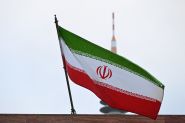- Home
- Middle East
- Azerbaijan Accuses Armenia of ‘Media Campaign’ at ICJ

©(Frederick Florin, AFP)
Armenia and Azerbaijan are facing each other at the ICJ on Monday over mutual "ethnic cleansing" claims, as tensions increase between the long-running enemies.
Azerbaijan and Armenia again crossed swords before the United Nation's top court on Monday, with Baku accusing Yerevan of using the high profile hearings to wage a "public media campaign" against its bitter Caucasus rival.
The latest legal clash over "ethnic cleansing" comes as military tensions are again ramping up between the neighbors following the conflict in the disputed mountainous area of Nagorno-Karabakh.
Robed lawyers and representatives from the two countries embarked on two weeks of hearings, wrestling over interpretations of international law in the gilded Peace Palace of the International Court of Justice (ICJ) in The Hague.
Azerbaijan's representative Elnur Mammadov told judges Armenia's lawsuit was "premature" and urged the court to throw out the case.
"That is because Armenia failed to engage in negotiations with Azerbaijan in an attempt to settle" the dispute, he said.
There were "limited negotiations," but Yerevan "failed to pursue them," Mammadov said.
"From the outset Armenia had it sights firmly set on commencing these proceedings before the court... and using the fact of these proceedings to wage a public media campaign against Azerbaijan," Mammadov said.
The legal battle before the ICJ dates from September 2021 when each side filed tit-for-tat suits against each other within a week.
They accused each other of "ethnic cleansing" and of violating the International Convention on the Elimination of All Forms of Racial Discrimination (ICERD).
The ICJ, which rules in disputes between states, issued emergency orders in December 2021, calling on both parties to prevent incitement and promotion of racial hatred.
But while the ICJ's orders are binding, it has no enforcement mechanism, and tensions continued to grow, culminating in Azerbaijan's lightning offensive last September in the disputed territory of Nagorno-Karabakh.
Baku reclaimed Karabakh in the one-day offensive, prompting the enclave's entire ethnic Armenian population—more than 100,000 people—to flee for Armenia.
Weeks later, Armenia returned to the ICJ, urging the court to order Azerbaijan to withdraw its troops from Karabakh and allow Armenian refugees to return home safely.
In November, the court ordered Azerbaijan to allow anyone wishing to return to Karabakh to do so in a "safe, unimpeded and expeditious manner."
The latest hearings, which run until April 26, concern objections raised by both parties to each other's original cases filed in September 2021.
Armenian Prime Minister Nikol Pashinyan and Azerbaijani President Ilham Aliyev have said, however, that a comprehensive peace agreement is within reach after last year's offensive in Karabakh.
The former Soviet republics have fought two wars for control of the mountainous region—most recently in 2020 and in the early 1990s amid the break-up of the Soviet Union—that have claimed thousands of lives on both sides and caused hundreds of thousands to flee.
Villages on both sides were destroyed and the mountainous region has been littered with countless landmines in the conflict's aftermath.
The conflict has also strained ties between Russia and ex-Soviet Armenia, with Yerevan considering that Moscow did not do enough to help when it was under attack.
In February, Armenia formally joined the International Criminal Court (ICC), despite Moscow warning against the move.
It is now obliged to arrest Russian President Vladimir Putin if he sets foot on Armenian territory under an ICC arrest warrant issued for the Russian leader in March 2023.
Jan Hennop, with AFP
Azerbaijan and Armenia again crossed swords before the United Nation's top court on Monday, with Baku accusing Yerevan of using the high profile hearings to wage a "public media campaign" against its bitter Caucasus rival.
The latest legal clash over "ethnic cleansing" comes as military tensions are again ramping up between the neighbors following the conflict in the disputed mountainous area of Nagorno-Karabakh.
Robed lawyers and representatives from the two countries embarked on two weeks of hearings, wrestling over interpretations of international law in the gilded Peace Palace of the International Court of Justice (ICJ) in The Hague.
Azerbaijan's representative Elnur Mammadov told judges Armenia's lawsuit was "premature" and urged the court to throw out the case.
"That is because Armenia failed to engage in negotiations with Azerbaijan in an attempt to settle" the dispute, he said.
There were "limited negotiations," but Yerevan "failed to pursue them," Mammadov said.
"From the outset Armenia had it sights firmly set on commencing these proceedings before the court... and using the fact of these proceedings to wage a public media campaign against Azerbaijan," Mammadov said.
Tit-for-Tat Lawsuits
The legal battle before the ICJ dates from September 2021 when each side filed tit-for-tat suits against each other within a week.
They accused each other of "ethnic cleansing" and of violating the International Convention on the Elimination of All Forms of Racial Discrimination (ICERD).
The ICJ, which rules in disputes between states, issued emergency orders in December 2021, calling on both parties to prevent incitement and promotion of racial hatred.
But while the ICJ's orders are binding, it has no enforcement mechanism, and tensions continued to grow, culminating in Azerbaijan's lightning offensive last September in the disputed territory of Nagorno-Karabakh.
Baku reclaimed Karabakh in the one-day offensive, prompting the enclave's entire ethnic Armenian population—more than 100,000 people—to flee for Armenia.
Weeks later, Armenia returned to the ICJ, urging the court to order Azerbaijan to withdraw its troops from Karabakh and allow Armenian refugees to return home safely.
In November, the court ordered Azerbaijan to allow anyone wishing to return to Karabakh to do so in a "safe, unimpeded and expeditious manner."
The latest hearings, which run until April 26, concern objections raised by both parties to each other's original cases filed in September 2021.
Peace Agreement Within Reach
Armenian Prime Minister Nikol Pashinyan and Azerbaijani President Ilham Aliyev have said, however, that a comprehensive peace agreement is within reach after last year's offensive in Karabakh.
The former Soviet republics have fought two wars for control of the mountainous region—most recently in 2020 and in the early 1990s amid the break-up of the Soviet Union—that have claimed thousands of lives on both sides and caused hundreds of thousands to flee.
Villages on both sides were destroyed and the mountainous region has been littered with countless landmines in the conflict's aftermath.
The conflict has also strained ties between Russia and ex-Soviet Armenia, with Yerevan considering that Moscow did not do enough to help when it was under attack.
In February, Armenia formally joined the International Criminal Court (ICC), despite Moscow warning against the move.
It is now obliged to arrest Russian President Vladimir Putin if he sets foot on Armenian territory under an ICC arrest warrant issued for the Russian leader in March 2023.
Jan Hennop, with AFP
Read more



Comments